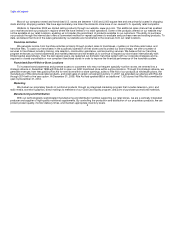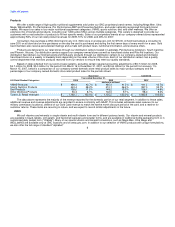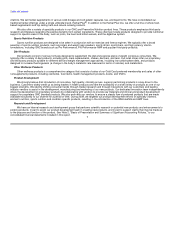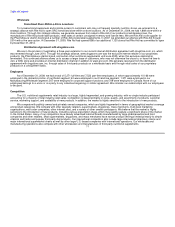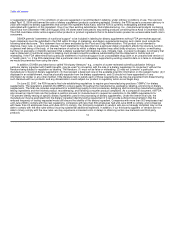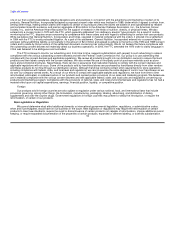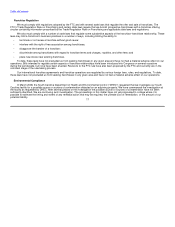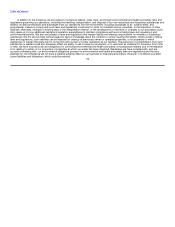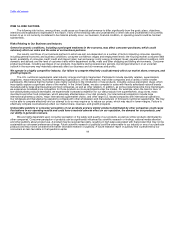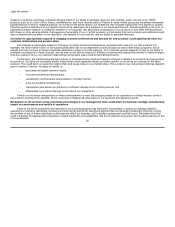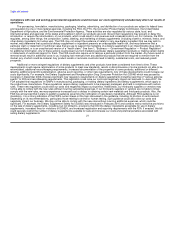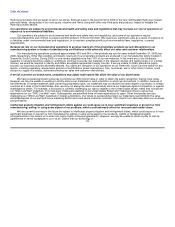GNC 2010 Annual Report Download - page 20
Download and view the complete annual report
Please find page 20 of the 2010 GNC annual report below. You can navigate through the pages in the report by either clicking on the pages listed below, or by using the keyword search tool below to find specific information within the annual report.
Table of Contents
In December 2006, Congress passed the Dietary Supplement and Nonprescription Consumer Protection Act (S3546) (the "Act"). The
Act, which became effective in December 2007, mandates reporting of "serious adverse events" associated with dietary supplements and over-
the-counter drugs to FDA by a manufacturer, packer, or distributor whose name appears on the label of the product. Records must be
maintained of all adverse events for six years after receipt. The Act also makes it illegal to submit a false report to the FDA.
The FDA has broad authority to enforce the provisions of the FDCA applicable to dietary supplements, including powers to issue a public
warning or notice of violation letter to a company, publicize information about illegal products, detain products intended for import, request a
recall of illegal products from the market, and request the Department of Justice to initiate a seizure action, an injunction action, or a criminal
prosecution in the U.S. courts. The regulation of dietary supplements may increase or become more restrictive in the future.
Legislation may be introduced which, if passed, would impose substantial new regulatory requirements on dietary supplements. Although
not yet reintroduced in this session of Congress, bills have been repeatedly proposed in past sessions of Congress which would subject the
dietary ingredient dehydroepiandrosterone ("DHEA") to the requirements of the Controlled Substances Act, which would prevent our ability to
sell products containing DHEA. In October 2004, legislation was passed subjecting specified substances formerly used in some dietary
supplements, such as androstenedione or "andro," to the requirements of the Controlled Substances Act. Under the 2004 law, these
substances can no longer be sold as dietary supplements. Also, in March 2009, the General Accounting Office (the "GAO") issued a report that
made four recommendations to enhance the FDA's oversight of dietary supplements. The GAO recommended that the Secretary of the
Department of Health and Human Services direct the Commissioner of the FDA to: (1) request authority to require dietary supplement
companies to identify themselves as a dietary supplement company as part of the existing registration requirements and update this information
annually, provide a list of all dietary supplement products they sell and a copy of the labels and update this information annually, and report all
adverse events related to dietary supplements; (2) issue guidance to clarify when an ingredient is considered a new dietary ingredient, the
evidence needed to document the safety of new dietary ingredients, and appropriate methods for establishing ingredient identity; (3) provide
guidance to industry to clarify when products should be marketed as either dietary supplements or conventional foods formulated with added
dietary ingredients; and (4) coordinate with stakeholder groups involved in consumer outreach to identify additional mechanisms for educating
consumers about the safety, efficacy, and labeling of dietary supplements, implement these mechanisms, and assess their effectiveness.
These recommendations could lead to increased regulation by the FDA or future legislation concerning dietary supplements.
The Dietary Supplement Safety Act (S 3002) was introduced in February 2010. The bill would repeal a provision of DSHEA that permits
the sale of all dietary ingredients sold in dietary supplements marketed in the United States prior to October 15, 1994, and instead permit the
sale of only those dietary ingredients included on a list of Accepted Dietary Ingredients to be issued and maintained by the FDA. The bill also
would allow the FDA to: impose a fine of twice the gross profits earned by a distributor on sales of any dietary supplement found to violate the
law; require a distributor to submit a yearly report on all non-serious Adverse Event Reports ("AERs") received during the year to the FDA; and
allow the FDA to recall any dietary supplement it determines with "a reasonable probability" would cause serious adverse health consequences
or is adulterated or misbranded. The bill also would require any dietary supplement distributor to register with the FDA and submit a list of the
ingredients in and copies of the labels of its dietary supplements to the FDA and thereafter update such disclosures yearly and submit any new
dietary supplement product labels to the FDA before marketing any dietary supplement product. If this bill becomes law, it could severely
restrict the number of dietary supplements available for sale and increase our costs and potential penalties associated with selling dietary
supplements.
The FTC exercises jurisdiction over the advertising of dietary supplements and over-the-counter drugs. In recent years, the FTC has
instituted numerous enforcement actions against dietary supplement companies for failure to have adequate substantiation for claims made in
advertising or for the use of false or misleading advertising claims. We continue to be subject to three consent orders issued by the FTC. In
1984, the FTC instituted an investigation of General Nutrition, Incorporated,
15


